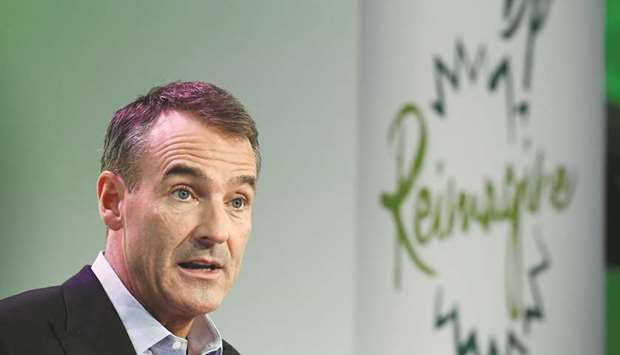BP Plc’s new boss set out the boldest climate plan of any major oil company, pledging to eliminate almost all of the carbon emissions from its operations and the fuel it sells to customers.
Bernard Looney, who has been the company’s chief executive officer for just a week, set an ambitious agenda for what’s becoming an existential challenge for the oil industry. While peers including Royal Dutch Shell Plc, Total SA and Equinor ASA have responded to investor pressure by adopting targets for emissions curbs, none has promised to zero out all emissions from the fossil fuels they pump from the ground.
Only Spain’s Repsol SA, a smaller refiner and energy producer, has gone further by pledging to fully eliminate “Scope 3” emissions, which include fuel it buys from third parties and sells to consumers.
“The world’s carbon budget is finite and running out fast; we need a rapid transition to net zero,” Looney said in a statement on Wednesday. “This will certainly be a challenge, but also a tremendous opportunity. It is clear to me, and to our stakeholders, that for BP to play our part and serve our purpose, we have to change.”
While Looney struck a confident tone, he faces an enormous task. For BP to survive the energy transition in a world that’s gradually falling out of love with oil, it will need to make big investments in new sources of clean energy, ensure cash keeps flowing from its fossil fuel assets, while also funnelling generous returns to investors.
It’s a balancing act that its closest peer Shell is already struggling to master.
“For us the statement represents a step change in terms of vision for the company and one that moves the group toward the biggest reorganisation and modernisation in at least two decades, if not a century,” analysts at Barclays said in a note. “The magnitude and radical nature of this shift should not be underestimated.”
Targeting Scope 3 emissions is a big step for an industry that produces the bulk of the world’s planet-warming emissions. To fulfil the pledge, Looney or one of his successors may one day face a hard reckoning – either shift energy production to renewables, invent commercially viable technology to store the carbon emitted from burning oil and gas, or stick with fossil fuels and accept that production will have to drop.
BP’s own operations emit the equivalent of about 55mn tonnes a year of carbon dioxide, while the oil and gas it pumps from the ground adds another 360mn tonnes, the company said. Looney plans to eliminate both those sets of emissions on a net basis by 2050 or earlier.
“This is what we mean by making BP net zero,” Looney said. “It directly addresses all the carbon we get out of the ground as well as all the greenhouse gases we emit from our operations. These will be absolute reductions, which is what the world needs.”
BP also aims to reduce by half the carbon intensity of the products it sells – including crude and fuels it purchases from other companies and sells to its customers – by offering people more choice of low- and no-carbon products. BP’s own upstream operations produced 1.14mn barrels a day of liquids in 2018, but it actually refined 1.7mn a day and its total sales to consumers were 2.74mn barrels a day, according to its annual report.
The plan is more ambitious than expected, but it won’t be plain sailing, said RBC Capital Markets analyst Biraj Borkhataria. BP’s commitment to do all this while still boosting free cash flow and shareholder returns is “really the key challenge,” he said.
In the early 2000s, the company re-branded itself as “Beyond Petroleum” under another visionary CEO, John Browne. But big investments in solar power largely failed. In one of his last interviews before leaving office, Looney’s predecessor Bob Dudley warned against Big Oil moving too fast on new technologies to counter climate change, because their failure could lead to financial ruin.
However, circumstances are changing. Becoming greener is no longer a choice for the world’s largest polluters.
The damaging effects of rising global temperatures are increasingly evident and established investors are starting to worry about the vulnerability of their investment portfolios to a climate crisis. It was among the most debated subjects in this year’s World Economic Forum in Davos. Last month, BlackRock Inc added its significant weight to a $41tn investor group that’s pressing the biggest emitters to change their ways.
The Church of England Commissioners, one of the activist investors that has been pressuring Big Oil, praised BP’s move.
“This is the ambition that the world needs,” Edward Mason, head of responsible investment, said in a tweet.

BP’s new chief executive Bernard Looney gives a speech in central London yesterday.
